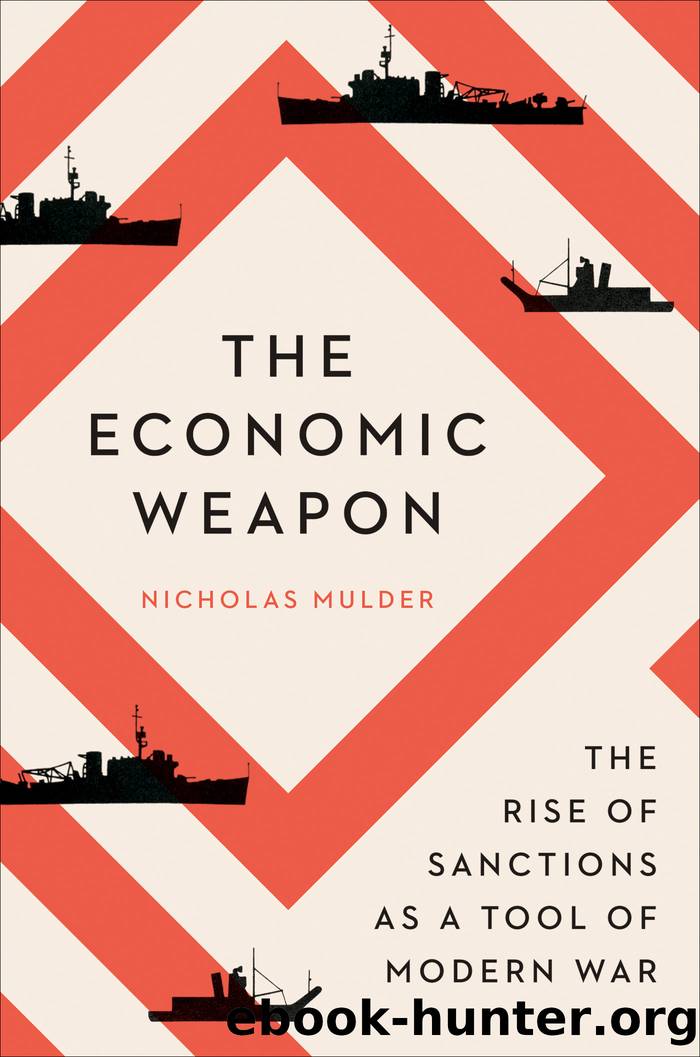The Economic Weapon by Nicholas Mulder

Author:Nicholas Mulder [Mulder, Nicholas]
Language: eng
Format: epub
ISBN: 9780300262520
Published: 2021-01-14T16:00:00+00:00
From Autarchy to Autarky
The effects of sanctions on world politics in the 1930s have been difficult to ascertain amid the general disorder caused by the Great Depression. The global crisis of the liberal economic system drastically undermined the international political order.11 The world economy of the 1930s was riddled with intrusive and coercive measures; tariffs, export subsidies, import quotas, exchange controls, clearing agreements, and boycotts were commonly used in many countries. This makes it difficult to isolate the effect of economic sanctions as a specific vector of instability. Even contemporaries sometimes struggled to distinguish them. During Council discussions about imposing sanctions on Germany in April 1935, Portuguese ambassador Da Mata asked, âDo not we all live in a period when import and export restrictions, quotas, licences and many other similar measures are applied indiscriminately to friendly States? . . . Are we not all suffering from permanent economic sanctions?â12 Amid the breakdown of international cooperation caused by the depression, this confusion was understandable. Trade wars with economic motives had become hard to tell apart from sanctions used for political ends.
This analytical problem extends to registering the impact of sanctions on national policy. Policies of economic nationalism were pursued by many states, even those without revisionist ambitions that thus had little reason to fear League sanctions.13 On closer inspection, however, it is possible to distinguish specific reactions to sanctions that go beyond general protectionist policies. In 1937, the Italian liberal economist Luigi Einaudi made a helpful distinction between the meaning of âautarchyâ as opposed to âautarky.â The ancient Greek term autarchy, he pointed out, derived from the words αá½ÏÏÏ (self) and á¼ÏÏή (rule). It had been used by Stoic philosophers to denote independence, a political state of self-rule, or a psychological condition of self-command. This concept was distinct from autarky, which combined αá½ÏÏÏ with the verb á¼ÏκÎÏ (to suffice) and entailed material self-sufficiency. As Einaudi pointed out, âautarchyâ was not just a different goal from âautarky.â The two aims could very well clash with each other in practice. Political independence could often be sustained only through connections with other states and support from other communities. An attempt at full autarky, then, might lead to the collapse of autarchy. For this reason, Einaudi criticized the Fascist response to sanctions, the self-reliance policy labeled autarchia, not just as an etymological error, but also as a step that would endanger the very political autonomy that Italy sought to achieve by it.14
Einaudiâs distinction between independence-enhancing autarchy and the more radical self-sufficiency of autarky is a useful way to think about economic policies in the 1930s. As Stefan Link has argued, no state in this period aimed at full material independence from the outside worldâa goal that was inherently unachievable for industrial countries.15 Common to the economic nationalism of the period was that it sought to restructure societiesâ engagement with international markets and finance; national coalitions pursued autarchy to achieve âtrade and investment relationships over which they [were] able to exert greater political control than previously.â16
Download
This site does not store any files on its server. We only index and link to content provided by other sites. Please contact the content providers to delete copyright contents if any and email us, we'll remove relevant links or contents immediately.
Zero to IPO: Over $1 Trillion of Actionable Advice from the World's Most Successful Entrepreneurs by Frederic Kerrest(4573)
Machine Learning at Scale with H2O by Gregory Keys | David Whiting(4313)
Never by Ken Follett(3957)
Harry Potter and the Goblet Of Fire by J.K. Rowling(3858)
Ogilvy on Advertising by David Ogilvy(3622)
Shadow of Night by Deborah Harkness(3368)
The Man Who Died Twice by Richard Osman(3080)
Book of Life by Deborah Harkness(2939)
The Tipping Point by Malcolm Gladwell(2925)
Will by Will Smith(2920)
Purple Hibiscus by Chimamanda Ngozi Adichie(2855)
0041152001443424520 .pdf by Unknown(2846)
My Brilliant Friend by Elena Ferrante(2831)
How Proust Can Change Your Life by Alain De Botton(2814)
How to Pay Zero Taxes, 2018 by Jeff A. Schnepper(2655)
Hooked: A Dark, Contemporary Romance (Never After Series) by Emily McIntire(2555)
Rationality by Steven Pinker(2366)
Can't Hurt Me: Master Your Mind and Defy the Odds - Clean Edition by David Goggins(2342)
Borders by unknow(2315)
